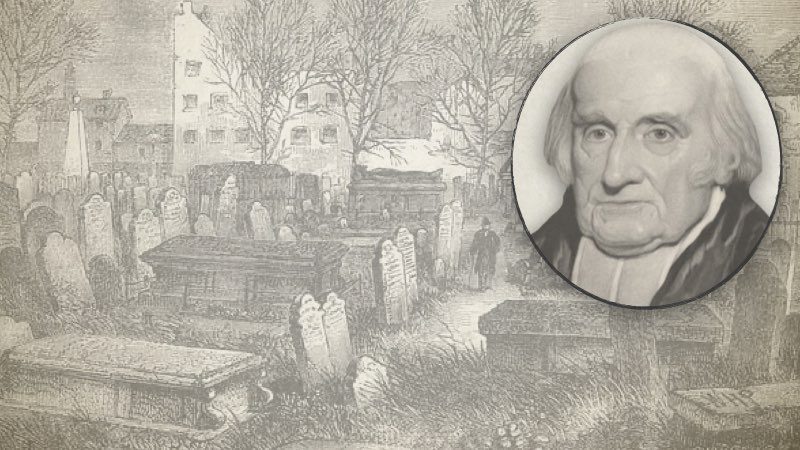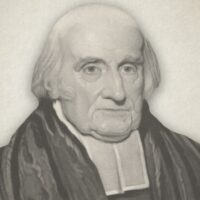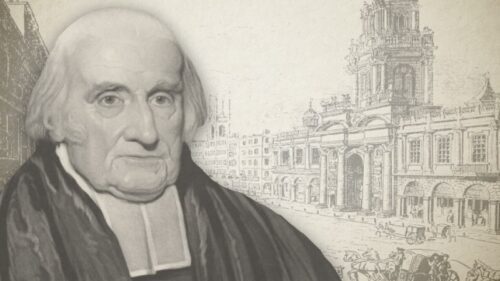
The Life And Death Of Watts Wilkinson
Bunhill Memorials, J. A. Jones:
Watts Wilkinson, A.B., Episcop. The Rev.Watts Wilkinson, A.B., Lecturer of the united parishes of St. Mary Aldermary, and St. Thomas the Apostle, Bow Lane; Tuesday Morning Lecturer at St. Bartholomew, Exchange; and late Chaplain to Aske’s Hospital; died Dec. 14th, 1840, in the 86th year of his age, and in the 62nd year of his ministry.
“They that be wise shall shine as the brightness of the firmament; and they that turn many to righteousness as the stars for ever and ever.”
Head Stone, E. and W. 74,—N. and S. 13.
The venerable Watts Wilkinson, A.B., was the son of Mr. Robert Wilkinson, and was born in London, Nov. 14th, 1755. “His father was a Protestant Dissenter of the old school, strictly orthodox in doctrinal sentiments. He was a member of the congregation under Dr. Guyse, in New Broad Street.” His son was under the influence of religious feelings at an early age; but when at school his serious impressions seemed to have worn off. A friend, greatly attached to the ministry of the late Rev. Henry Foster, prevailed upon him, with much difficulty, to attend one of his Friday Evening Lectures at St. Antholin’s church. But, so strong were his prejudices at that time against the Establishment, that, as he often observed, he felt as if afraid lest the steeple should fall upon him, when he passed under it. To that evening, Sept. 11th, 1772, he frequently alluded, as one never to be forgotten by him; and has pointed out the spot in the aisle, where he stood during the sermon, which was delivered from 2 Cor. 2:11. From that time he attended the ministry of Mr. Foster, whenever his circumstances would permit.
Having had some experience of the power of the gospel speaking peace to his conscience, and being filled with love to his Redeemer; he felt an earnest desire to consecrate himself to the work of the ministry. His biographer informs us, that Mr. Wilkinson “now began to feel a predilection for the Established Church; and a strong desire, that if it were the will of God, and he could conscientiously conform to it, he might be called to the sacred ministry within its pale.” With this “strong desire” it is not matter of much surprise, that he soon became “convinced that the New Testament contains no argument in favour of the Independent or Congregational mode of church government; and considered lay preaching to be liable to very serious objections!!”
Having availed himself of the best means within his reach, for improvement in classical literature, he at length entered as a commoner, at Worcester College, Oxford. He concluded his residence at Oxford by taking the degree of Bachelor of Arts; he was ordained a Deacon in the Chapel Royal, St. James’s, in Feb. 1779. He commenced his public ministry in the afternoon of the same day, at the church of St. Anne, Blackfriars. The subject of his sermon was the conversion of Manasseh. At the close of the same year, he obtained the lectureship of the united parishes of St. Mary, Aldermary, and St. Thomas the Apostle, London; and, in Feb. 1780, was elected chaplain of Aske’s Hospital, Hoxton. About this time he pursued his studies with the greatest diligence; “availing himself of the aid of the most approved commentators, and in particular of the older Puritan Divines; though he entirely disapproved of their political principles, and Nonconformity.”
In the year 1798, he became a candidate for the Wednesday Evening Lectureship, in the church of St. Antholin, Watling Street, which he resigned soon after he obtained the Tuesday Morning Lectureship of St. Bartholomew, by the Royal Exchange. This has been long called the “Golden Lecture,” from the very large endowment attached to it. This lecture Mr. Wilkinson retained the long period of upwards of thirty-seven years. The contrast, on a Tuesday morning, between the scene without and within the church, was peculiarly striking. Outside, a dense multitude of persons, apparently in eager pursuit of temporal things; amidst the noise and bustle of carriages innumerable, passing to and fro in every direction: within its walls, a crowded congregation, engaged in the solemn worship of God; pursuing those things which are unseen and eternal; listening with devout attention to the words of eternal life, even the glorious gospel of the blessed God.—In the month of February, 1840, Mr. Wilkinson was seized with a violent cold and severe cough, which shook his tender frame (consequent of his great age), in no small degree. He was enabled shortly to resume his lectures, but his little remaining strength was but labour and sorrow. He preached for the last time at St. Bartholomew’s, April 28th, 1840, after which that church was doomed to destruction.
A church in which rested the mortal remains of that venerably divine, Myles Coverdale, Bishop of Exeter, who had the high honour of presenting to this nation the first complete English Bible; which was published in the year 1536. (He died in peace, May 20th, 1567, aged 81 years; and was buried near to the Communion Table, where his remains were discovered on the demolition of the church, at a considerable depth below the surface, and re-interred in the church of St. Magnus, London Bridge, of which he had formerly been rector.) The parish of St. Bartholomew being united to that of St. Margaret, Lothbury, Mr. Wilkinson continued to deliver his lecture in this church, until Sept. 1, 1840, when he preached from Jer. 17:17, Thou art my hope in the day of evil. On the following Lord’s day afternoon, he preached at St. Mary’s, Aldermary, from Eph. 2:19, Ye are no more strangers and foreigners, &c. His cough being distressing, he was constrained to finish sooner than usual. This was the close of his public ministry. On his return home, he expressed his conviction that, he should never preach again. His apprehension proved true. His appointed work was done: it was the will of God that he should now rest from his labours. It pleased God, however, to spare him fourteen weeks longer in the body; and his dying days (as they may be called), confirmed and sealed the witness to the truth of his public ministry. He frequently observed to one and another, “Glory be to his name, I am fixed upon the rock; a firm foundation is beneath me.” “I find it very delightful to look back upon all the way by which the Lord has been leading me these twice forty years in the wilderness. Under mysterious dispensations of providence, I have often derived great consolation from that text, ‘What I do thou knowest not now, but thou shalt know hereafter.’ Never did I expect on earth to have the ‘need be’ for every trial so clearly revealed to me, as I have of late. I feel and know that I have not only been led by a right way to a city of habitation, but by the only right way that could have led me there.”
The retrospect which he took of his ministry, now that he believed it to be finally closed, was one which filled him with holy awe, as he reflected on the responsibility of his office. “When (said he) I recollect how many thousands, in the course of my long ministry, I have had to speak to, I am quite overpowered. I trust I have led them right; one thing I am quite certain of, that, in all sincerity of mind, I have preached unto them what I considered to be the truth. Nor do I recollect that in any one sermon during my whole life, I have ever disguised my sentiments to meet the prejudices of any one. In looking back upon my ministry, this is the only point on which I can fix with any satisfaction!!” On one occasion he observed, with some degree of emotion, “I have been trying to read a little in my Bible, but, I cannot do that now without fatigue: that blessed book, (and he cast his eyes upon it,) has been my constant study for above sixty years; I can still feed upon it; it seems as fresh in my memory as ever; I believe I could quote any part of it as well as ever. O! the mercy and loving-kindness of the Lord to me is unbounded! Cleave closely to Jesus; cleave closely to Jesus! The truths I have been preaching all my life, are my support and comfort now.” On another occasion, when alluding to the doctrines maintained by him in his ministry, he said, “I wish to leave this as my dying testimony, that these alone were the doctrines which supported me when I was first convinced of sin, without which I never could have found peace; and, with this experience of their preciousness in my own soul, how could I withhold them from others? They have been my support and comfort all my life, and now in the near approach of an opening eternity, I still find them sufficient to bear me up, as a firm foundation beneath my feet.” He was peculiarly favoured in his last moments. On the night but one before his decease, he was overheard to say, “Christ is worth more than ten thousand worlds. I do desire to depart, I do desire to depart.”
O let me catch one glimpse of Thee!
Then drop into eternity!
After this he continued to sleep two or three hours, more or less; but, life was now ebbing fast away. One word more was heard from him, which he repeated three times feebly, name, name, name!” What name could that be, but the name of Jesus? A gentle slumber followed; an affectionate daughter stood watching beside him; she thought the breath had ceased; she listened intently—it was even so! “He was absent from the body, and present with the Lord!” This great, and to him glorious change, took place on Monday, December 14th, 1840.
Watts Wilkinson was a burning and a shining light. He was enabled to honour God his Saviour, by the faithful discharge of the ministry to which he was called; and, God honoured him, by employing him during a period of nearly sixty-two years, in feeding the church which Christ purchased with his own blood; and, “When the chief shepherd shall appear, he shall receive a crown of glory that fadeth not away.”—Memoir by his Son.
Watts Wilkinson (1755-1840) was a High-Calvinist Anglican preacher. He is best known as the “Golden Lecturer” at St. Bartholomew's, by the Royal Exchange, where, on Tuesday mornings, crowds would gather including a number of notable men such as Joseph Irons and the Earl of Roden.




